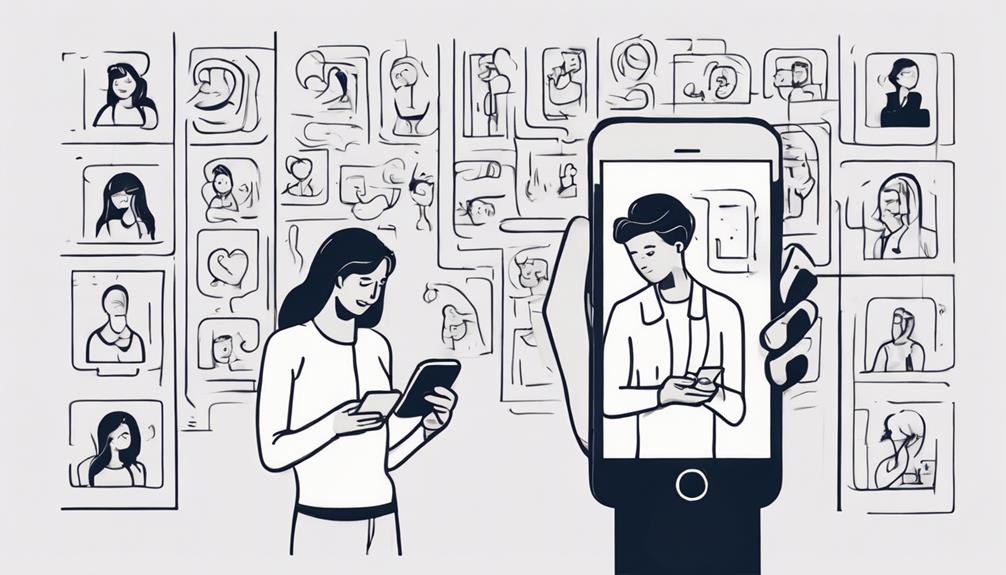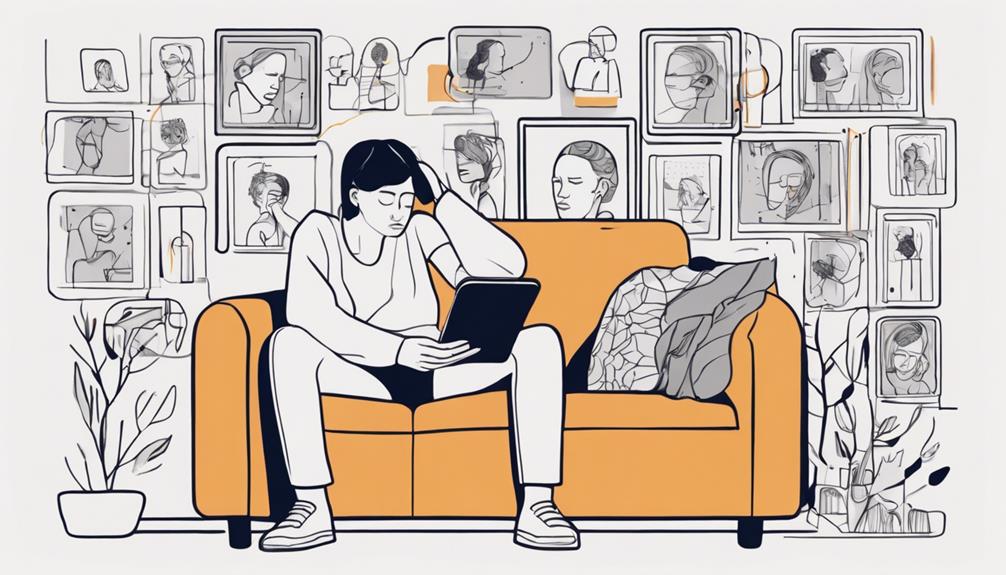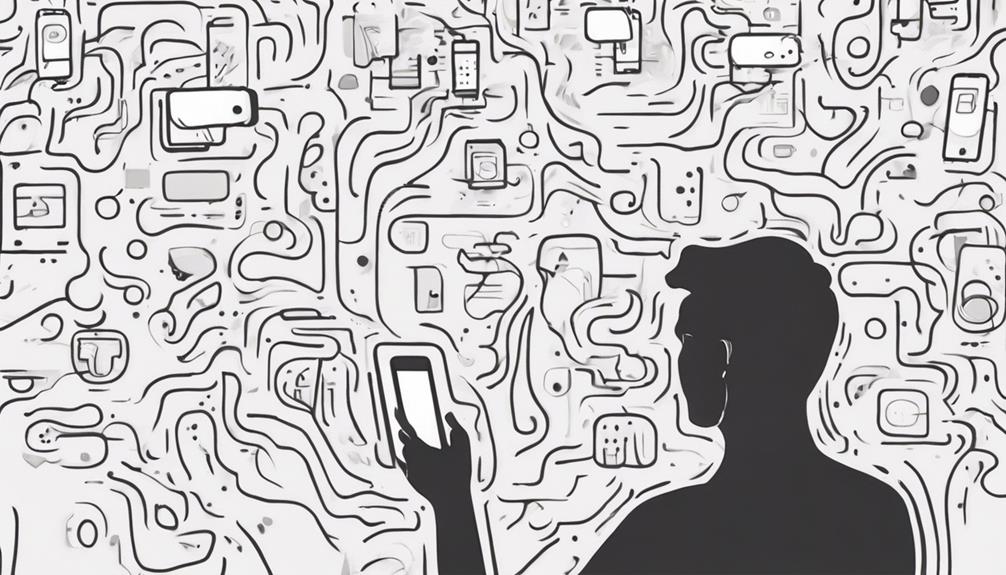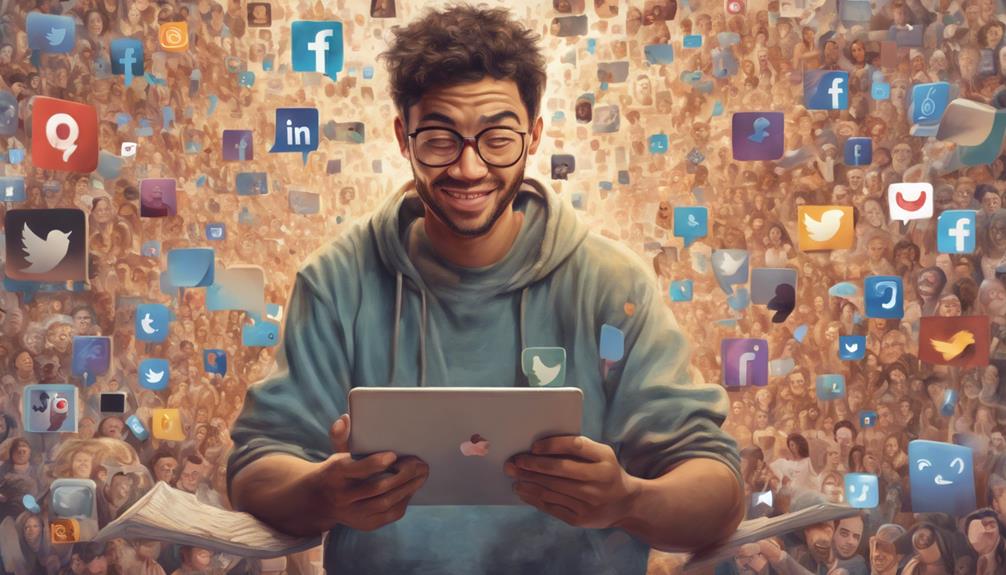The impact of social media on self-esteem is a complex and nuanced subject that warrants careful examination. In a society where virtual personas often overshadow reality, individuals, especially the younger generation, face a constant barrage of comparison and validation-seeking behaviors online. This phenomenon raises questions about the authenticity of self-perception in the digital age and the lasting implications it may have on mental well-being. As we explore the intricacies of social media's influence on self-esteem, it becomes apparent that understanding the underlying mechanisms at play is crucial for navigating this evolving landscape.
Key Takeaways
- Social media use correlates with decreased self-esteem.
- Idealized images on social media trigger self-comparison and lower self-worth.
- Comparing oneself to edited images fosters negative self-perceptions.
- Maintaining healthy self-esteem requires conscious social media moderation and self-acceptance.
Social Comparison Theory

Social Comparison Theory posits that individuals assess their own social and personal value by comparing themselves to others, a process that influences their self-esteem. When applied to social media, individuals engage in upward social comparison, where they compare themselves to those perceived as superior, and downward social comparison, where they compare themselves to those considered inferior. Social media platforms play a significant role in facilitating these comparisons by providing constant exposure to the lives and achievements of others. Studies have shown a positive correlation between the frequency of social media use and higher levels of social comparison, impacting self-esteem. Excessive social comparison on social media can lead to decreased self-esteem and heightened feelings of inadequacy. Understanding the implications of Social Comparison Theory in the context of social media is crucial in addressing self-esteem issues that may arise from continuous exposure to curated online personas and lifestyles.
Influence on Body Image
The impact of social media on self-esteem, particularly concerning the influence on body image, is significant due to the promotion of unrealistic beauty standards and the correlation with negative perceptions of one's physical appearance. Exposure to idealized body images on social media can lead to body dissatisfaction and low self-esteem. Comparison with edited and filtered images on social media can distort individuals' perceptions of their own bodies, fostering feelings of inadequacy. Studies have shown a direct link between high social media use and increased concerns about body image and the development of disordered eating behaviors. Constant exposure to flawless bodies on social media can trigger self-consciousness about one's appearance, further perpetuating unrealistic beauty standards and negative self-perceptions.
- Exposure to idealized body images
- Comparison with edited and filtered images
- Link between high social media use and body image concerns
- Constant exposure to flawless bodies
Impact on Mental Health

Exposure to social media platforms has been associated with a decline in mental health indicators, particularly among adolescents and young adults. The impact on mental health is profound, with studies highlighting various negative consequences. Social media use has been linked to decreased self-esteem, especially in adolescents who spend excessive time on these platforms. Seeking validation through likes and comments can significantly impact self-worth, leading to a cycle of seeking external approval for self-esteem. Furthermore, the prevalence of cyberbullying on social media can have detrimental effects on mental well-being, causing distress and lowering self-esteem levels. The constant exposure to curated, idealized images on social media fosters social comparison, often resulting in feelings of inadequacy and a skewed self-image. This can contribute to increased levels of anxiety and even depression, with girls between the ages of 10 and 14 being particularly vulnerable.
| Impact on Mental Health | |
|---|---|
| Adolescents | Decreased self-esteem |
| Self-worth | Cyberbullying |
| Social comparison | Validation |
| Anxiety | Depression |
Role in Self-Perception
Distorting perceptions through curated presentations, social media platforms have been found to exert a significant influence on individuals' self-perception. Social media plays a crucial role in shaping how young individuals view themselves, often leading to distorted self-perception. Key factors influencing this phenomenon include:
- Idealized Versions: Social media tends to showcase edited and idealized versions of life, creating unrealistic standards for comparison.
- Highlight Reel: Users often share only the highlights of their lives, omitting struggles and difficulties, which can skew others' perceptions of reality.
- Influence on Self-Esteem: Studies indicate that 43% of teenagers feel pressured to present a positive image on social media, impacting their self-esteem.
- Different from Reality: Understanding that social media is a curated space and does not always reflect real-life experiences is crucial for maintaining a healthy self-perception.
Confidence and Validation

Social media's impact on self-esteem extends beyond distorting perceptions to influencing individuals' confidence and validation-seeking behaviors. Social media platforms often become avenues for seeking external validation, where individuals rely heavily on likes and comments to assess their self-worth. This constant quest for validation can create a detrimental cycle of dependence on external approval, ultimately impacting one's self-esteem. While receiving validation through likes and comments can offer temporary boosts to self-esteem, it may not address the root causes of low self-worth. This behavior can overshadow genuine self-confidence and contribute to feelings of inadequacy when the validation is not received as expected. Developing a healthy sense of self-confidence that is independent of social media validation is crucial for maintaining a strong self-esteem foundation.
| Social Media Impact | Validation | Self-Esteem |
|---|---|---|
| Seeking external approval through likes and comments | Creates a cycle of dependence | Can lead to feelings of inadequacy |
| Temporary boosts to self-esteem | Overshadows genuine self-confidence | Highlights need for self-validation |
| Dependency on external validation | May not address underlying self-worth issues | Importance of healthy self-confidence |
Strategies for Self-Esteem Boost
Implementing strategies to boost self-esteem involves incorporating positive self-talk techniques, limiting social media exposure, and focusing on personal strengths. These approaches aim to shift one's mindset towards more empowering and uplifting perspectives, ultimately contributing to improved self-esteem and mental well-being. By consciously adopting these methods, individuals can cultivate a healthier self-image and navigate social media influences more effectively.
Positive Self-Talk Techniques
Utilizing positive self-talk techniques is a valuable method for enhancing self-esteem and promoting a more positive self-perception. Positive self-talk involves affirming statements that counter negative thoughts, ultimately boosting self-esteem and improving overall well-being. Here are four key strategies for implementing positive self-talk techniques:
- Affirming one's achievements and qualities to build self-confidence.
- Practicing gratitude to shift focus towards positivity and appreciation.
- Reframing negative beliefs into more empowering and compassionate perspectives.
- Cultivating self-compassion by treating oneself with kindness and understanding.
Research indicates that integrating these techniques into daily routines can lead to improved mood, reduced stress levels, and a stronger sense of self-worth.
Limit Social Media
To foster a healthier self-esteem and minimize potential negative impacts, a strategic approach involving conscious moderation of social media consumption is imperative. Limiting social media usage to specific times of the day can help reduce comparison and negative self-perception. Setting boundaries on social media interactions, such as avoiding scrolling before bed, can support a healthier self-esteem. Unplugging from social media on weekends or during personal time can create space for self-reflection and positive self-image development. Engaging in offline activities and hobbies instead of constant social media use can promote self-esteem and self-worth. Creating a supportive and positive social media environment by following accounts that promote self-acceptance and well-being can enhance self-esteem.
Focus on Strengths
Focusing on personal strengths is a fundamental strategy for boosting self-esteem amidst the pervasive influence of social media comparisons. Recognizing individual accomplishments and positive qualities can counteract the negative impact of idealized social media portrayals. Engaging in activities that showcase talents and skills not only builds self-confidence but also fosters resilience against social media-induced self-doubt. Encouraging self-appreciation and self-validation, rather than seeking external validation through social media, can enhance self-esteem. Developing a healthy self-image by celebrating personal achievements and uniqueness serves as a protective shield against the detrimental effects of social media comparisons on self-esteem.
Parental Guidance on Social Media
Effective parental guidance on social media is crucial for safeguarding teens' self-esteem in today's digital age. Parents can protect their teens' well-being by monitoring social media use, setting limits on screen time, and establishing boundaries for when and how social media is accessed. By discussing the unrealistic nature of social media content with teens, parents can help them differentiate between online personas and reality, reducing the potential negative impact on self-esteem. Adjusting notification settings to minimize distractions and encouraging offline activities also play a vital role in promoting a healthier balance in teens' social media use, thus positively impacting their self-esteem. Leading by example with healthy social media habits demonstrates behaviors and values that can benefit teens' self-esteem. By actively engaging in these strategies, parents can guide their teens towards a more positive relationship with social media and ultimately enhance their self-esteem in the digital age.
Frequently Asked Questions
How Does Media Affect Children's Self-Esteem?
Media significantly impacts children's self-esteem through various channels. Parental influence, peer comparison, body image portrayal, cyberbullying, online validation, filtered reality, FOMO, unrealistic standards, and social comparison all play crucial roles. Understanding these factors is essential in comprehending how media shapes children's perception of themselves. By examining these elements, we can better address the complexities surrounding the impact of media on children's self-esteem.
How Does Social Media Make You Feel Insecure?
Constantly scrolling through social media can plunge individuals into the comparison trap, triggering feelings of inadequacy. The pressure to match unrealistic standards portrayed by digital influencers on body image and lifestyles can fuel a fear of missing out and seeking validation through likes. Social comparison often leads to a cycle of seeking external approval, fostering insecurity and self-doubt. Cyberbullying exacerbates these negative effects, amplifying feelings of unworthiness and insecurity.
How Does Social Media Affect Mental Health Negatively?
Social media negatively impacts mental health through various mechanisms. The comparison trap, unrealistic standards, cyberbullying impact, constant validation seeking, negative body image promotion, fear of missing out, anxiety triggers, self-worth doubts, and digital pressure all contribute to this phenomenon. These factors can exacerbate mental health issues, leading to increased rates of anxiety, depression, and decreased overall well-being, especially among vulnerable populations like adolescents and young adults.
How Does Tiktok Affect Self-Esteem?
TikTok's influence on self-esteem is profound. Users are exposed to unattainable beauty standards, fostering comparisons that erode self-worth. The fixation on follower counts and engagement with viral challenges can intensify feelings of inadequacy. Filter culture and validation-seeking behavior further exacerbate negative body image perceptions. Influencers on TikTok wield significant influence, impacting self-esteem through curated content. Cyberbullying adds another layer of harm, highlighting TikTok's complex role in shaping self-esteem.
Conclusion
In conclusion, the impact of social media on self-esteem can be likened to a double-edged sword, offering both connection and comparison. Understanding the influence of social media on self-perception and mental health is crucial in navigating its effects on individuals. By implementing strategies such as unfollowing triggering accounts and seeking support, individuals can mitigate negative impacts and cultivate a healthier sense of self-esteem in the digital age.
